The Lunar Affliction
The first time I saw Thomas Blackwood prowling the grounds of Ravensmoor Cemetery, I mistook him for a common grave robber. How wrong I was. The year was 1868, and I had recently taken the position of groundskeeper at the ancient burial ground that sat like a jagged wound upon the Yorkshire moors. The autumn moon hung bloated and yellow in the sky that night, casting long shadows across the weathered headstones.
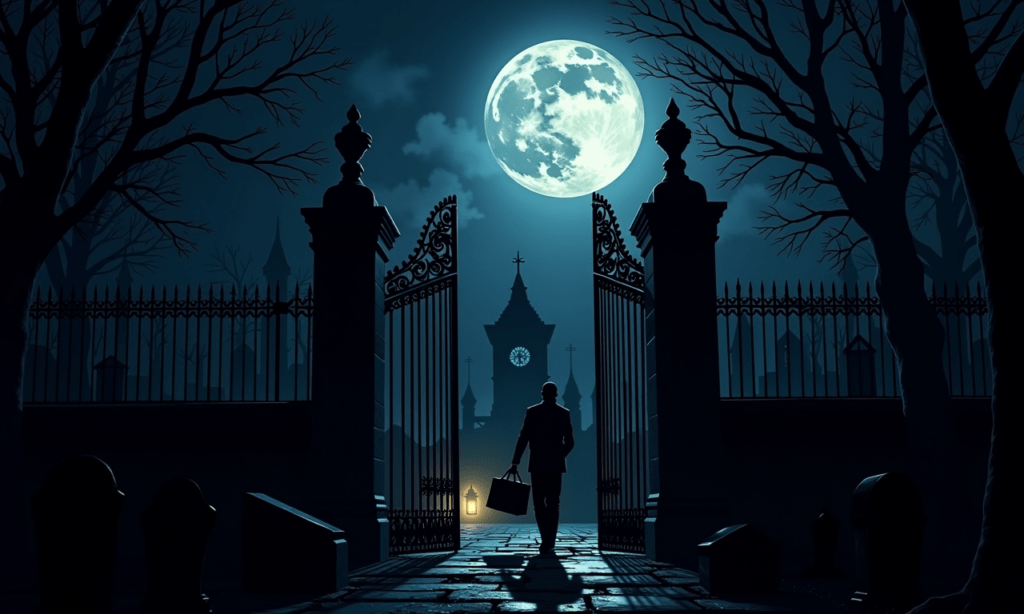
What drew my attention was not his presence alone – we had our share of mourners who visited at odd hours – but rather the peculiar way he moved. Thomas Blackwood, once a respected physician in our parish, now skulked between the graves with an animal grace that seemed altogether inhuman. His once-immaculate waistcoat hung in tatters, and his face, when caught in the moonlight, bore the waxy pallor of one who had long shunned the sun.
The locals whispered that his affliction began after the death of his young wife, when he took to his laboratory in a desperate attempt to understand the boundary between life and death. But what he discovered there, in those long nights of scientific pursuit, was something far more ancient and terrible than mere mortality.
They say madness comes in stages, like the waxing of the moon. For Thomas Blackwood, it began the night Eleanor died. Consumption had taken her slowly, cruelly, and he had been forced to watch as his beloved withered away despite all his medical knowledge. But it was what he found clutched in her cold fingers that set him upon his dark path – a leather-bound journal, its pages filled with her increasingly fevered writings about an ancient Romanian text she’d been translating.
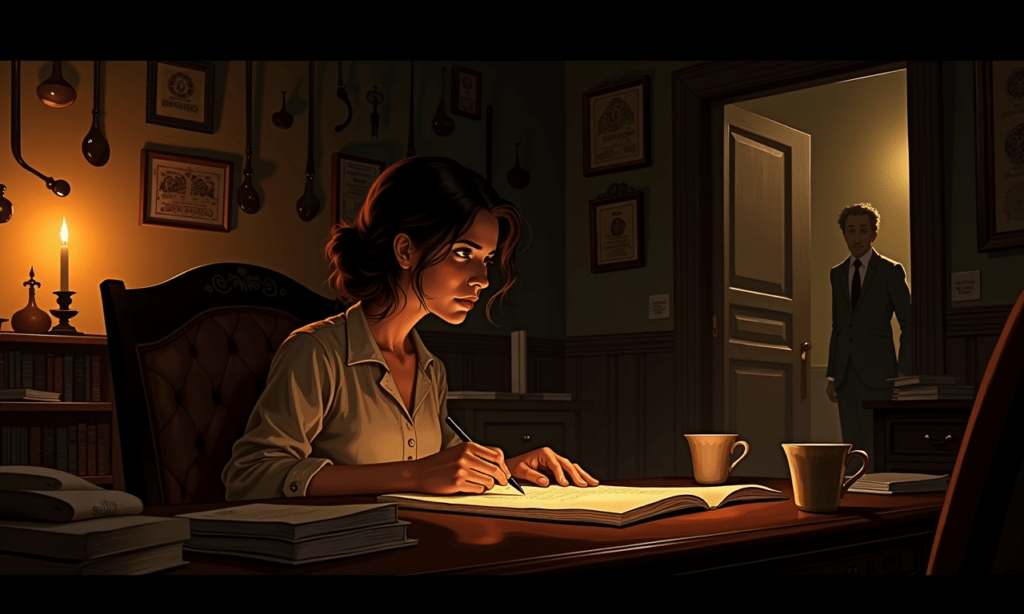
Eleanor, you see, had been more than just a doctor’s wife. She was a scholar of antiquities, with a particular interest in folkloric customs surrounding death and transformation. The manuscript she’d been studying spoke of a condition that the ancient Greeks had called “lykanthropy” – a melancholy so deep it could transform a grieving soul into something neither man nor beast.
In his grief, Thomas became obsessed with her final research. He converted their home’s cellar into a laboratory, filling it with arcane texts and strange instruments. The townspeople spoke of hearing odd chants late at night, of seeing him dig up fresh graves only to return the bodies days later, changed somehow. Some said he was searching for a way to bring Eleanor back. Others, that he was trying to follow her into death itself.

But the truth, as I later learned, was far stranger. In Eleanor’s translations, Thomas had found references to a ritual – one that promised to free the practitioner from the bonds of mortality and grief. It required specific conditions: the light of a full moon, ground sanctified by death, and a willingness to surrender one’s humanity to escape the pain of loss. What Thomas failed to understand was that such rituals exact a terrible price, transforming not just the body, but the very soul of the participant.
His first transformation occurred six months after Eleanor’s death, on a night when the moon hung as full and heavy as it had the night I first spotted him among the graves. The physician’s rational mind began to crack, giving way to something primal and hungry that had been lurking in the shadows of his grief all along.
It was on a similar night that I finally confronted him. The moon had risen like a sovereign over her court of stars, and I was making my final rounds when I heard the sound – something between a sob and a howl, echoing from Eleanor’s mausoleum. Clutching my lantern, I approached the marble structure, its classical columns casting bars of shadow across the frost-rimed ground.
“Dr. Blackwood,” I called out, my voice steady despite my racing heart. “I know you’re there.”
The scratching sounds from within ceased. Then came his voice, barely recognizable, as if human speech had become foreign to his transformed throat. “Leave me to my vigil, groundskeeper. There are things here you don’t understand.”
But I stood my ground, remembering the stories, the research I’d done. “I understand more than you think, sir. I’ve read Eleanor’s journal – the one you left behind in your last… episode.”
A growl rumbled from the darkness, and I saw his figure emerge. His face was a horror of transformation caught mid-way – features elongated, teeth bared in a grimace too wide for a human mouth. But it was his eyes that struck me most deeply: human eyes still, filled with such profound sorrow that I nearly dropped my lantern.
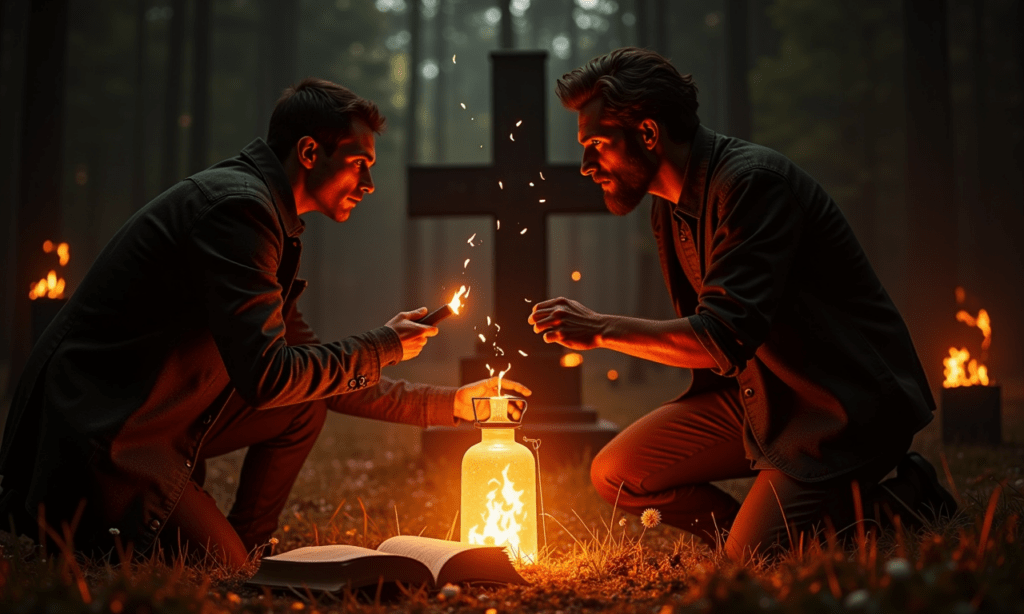
“Then you know why I cannot leave,” he rasped. “The ritual is incomplete. Each full moon, I come closer to understanding what Eleanor discovered. The boundary between grief and transformation, between love and madness…”
“She wasn’t trying to find a way to escape death, Dr. Blackwood,” I said softly, drawing the journal from my coat. “She was trying to prevent this very thing from happening to others. The manuscript she was translating wasn’t a guide – it was a warning.”
His transformation was instantaneous and terrible. The moment I spoke those words about Eleanor’s true purpose, something in Blackwood shattered. His body contorted, bones cracking and reshaping beneath his skin with wet, organic sounds. The last human light in his eyes guttered out like a candle in a gale.
“LIES!” The roar that erupted from his throat was neither human nor beast, but something born of pure anguish. He lunged forward with unnatural speed, claws extended where hands had been moments before. I barely managed to dodge, the leather journal falling from my grasp as I stumbled backward over a gravestone.
My lantern shattered against a monument, spilling burning oil across the frozen ground. The flames caught the dry autumn leaves, creating a barrier of fire between us. In the dancing light, I could see him fully now – the thing that had once been Thomas Blackwood. His face had elongated into a lupine muzzle, yet retained enough of his human features to make the sight all the more horrifying. Patches of fur erupted through his tattered clothing, and his fingers had become curved talons that left deep gouges in the marble of Eleanor’s mausoleum.
“She loved me,” he snarled, circling the flames. “Everything she did was to save me from death’s separation!”
“She loved you enough to try to save you from this!” I shouted back, my hands finding purchase on an iron cross that had fallen from its mounting. “Look at her journal! The final pages—”
He launched himself through the flames, his coat catching fire as he tackled me to the ground. The iron cross swung wildly, connecting with his shoulder. The touch of the metal elicited a howl of pain, and I realized with sudden clarity why the old texts always spoke of silver and iron as weapons against such creatures.
We rolled across the frost-covered grass, a frenzied tangle of man and beast. His teeth snapped inches from my throat as I desperately fought to keep the iron cross between us. The metal sizzled where it touched his flesh, filling the air with an acrid smell like burning hair.
“Thomas,” I gasped, using his Christian name, “Eleanor’s last words… in the journal… read them…”
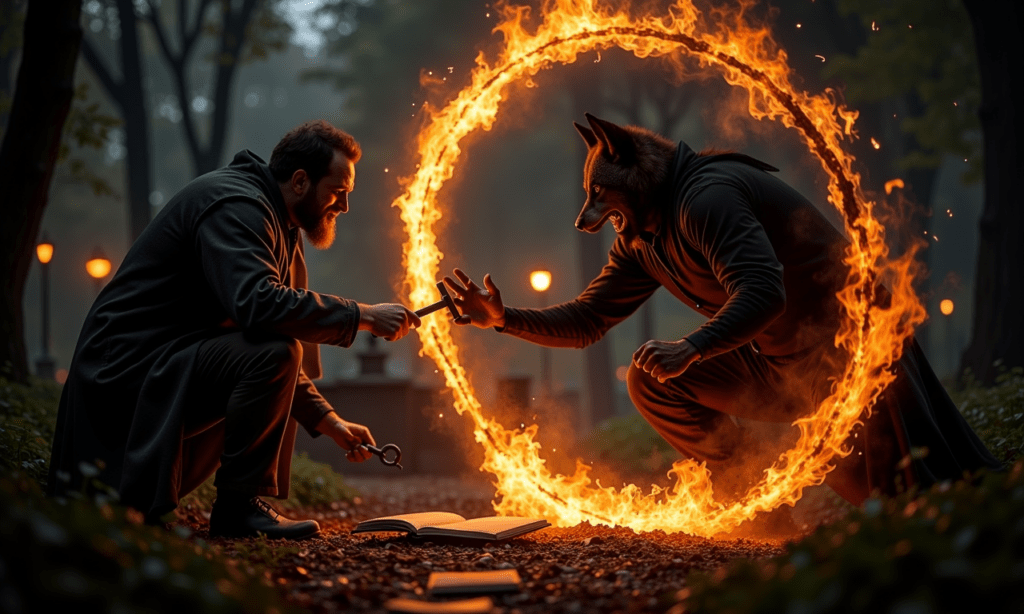
But the creature attacking me seemed beyond reason now. One massive paw pinned my shoulder, claws piercing flesh. With my free hand, I groped blindly in the darkness, fingers closing around Eleanor’s fallen journal. In a desperate move, I swung it up between us.
The leather-bound book connected with his muzzle, falling open to its final pages. Eleanor’s handwriting, increasingly frantic as her illness progressed, caught in the firelight:
“My dearest Thomas, if you find this, know that my research was always to protect you. The lykanthropy isn’t a cure for grief – it’s grief’s ultimate corruption. The price of the ritual isn’t just humanity, it’s the very ability to remember love itself. Fight it, my love. Remember me as I was, not as a reason to become—”
His howl of anguish split the night air. The beast reared back, clawing at its own face as if trying to tear away the transformation. I seized the moment, driving the iron cross up with all my strength. The pointed end struck home, penetrating his chest.
What happened next would haunt my dreams until my dying day.
As Blackwood lay impaled upon the iron cross, his body began to change once more – not into man or beast, but something in between. His final words were not a howl, but a whisper: “Open her tomb.”
The transformation that followed was not the violent metamorphosis I had witnessed before, but rather a slow diminishing, as if every moment of his haunted existence was finally catching up with him. By the time the moon had slipped behind the clouds, what remained was barely recognizable as the man or monster he had been.
But his words echoed in my mind: “Open her tomb.”
The fire had died to embers, and in their fading light, I approached Eleanor’s mausoleum with trembling hands. The lock was already broken – had been for months, I realized. Inside, the air was thick with the smell of decay and something else… something chemical.
Eleanor’s coffin lay open.
What I found inside made my blood run cold. The body was there, yes, but it had been… altered. Surgical scars criss-crossed the preserved flesh, and beside her lay a journal different from the one I had found – this one in Thomas’s handwriting. As I read by matchlight, the true horror of what had occurred began to unfold.
Eleanor had indeed discovered the ritual of lykanthropy in her translations, but Thomas’s journal revealed a terrible truth: she hadn’t died of consumption at all. In his grief-stricken madness, Thomas had convinced himself that her research was meant to save them both. He began experimenting on her as she slept, attempting to trigger the transformation he believed would free her from her illness.
The “consumption” that had wasted her away was actually the result of his failed attempts to force the change. The cough that plagued her final days came from the exotic herbs and tinctures he had administered. Her fever dreams were induced by ritual drugs he crafted in his laboratory.
But most horrifying of all was the revelation that Eleanor had been aware during her final days. She had known what Thomas was doing, and her translation work had taken on a desperate race against time. The manuscript she had been working on wasn’t just a warning about lykanthropy – it was a chronicle of how to reverse it. Her final pages were not just a message to Thomas, but a cure she had discovered too late to save herself.
The ritual Thomas had eventually performed, the one that transformed him, required the essence of one who had died from a failed transformation attempt. In his madness, he had never realized that he himself had created the very conditions necessary for his curse – through Eleanor’s suffering.
Looking back at his body in the moonlight, I understood at last why he had haunted this cemetery, why he had pursued his heinous experiments on the recently buried. He hadn’t been trying to bring Eleanor back; he had been trying to replicate the conditions of her death, to understand what had made his own transformation possible.
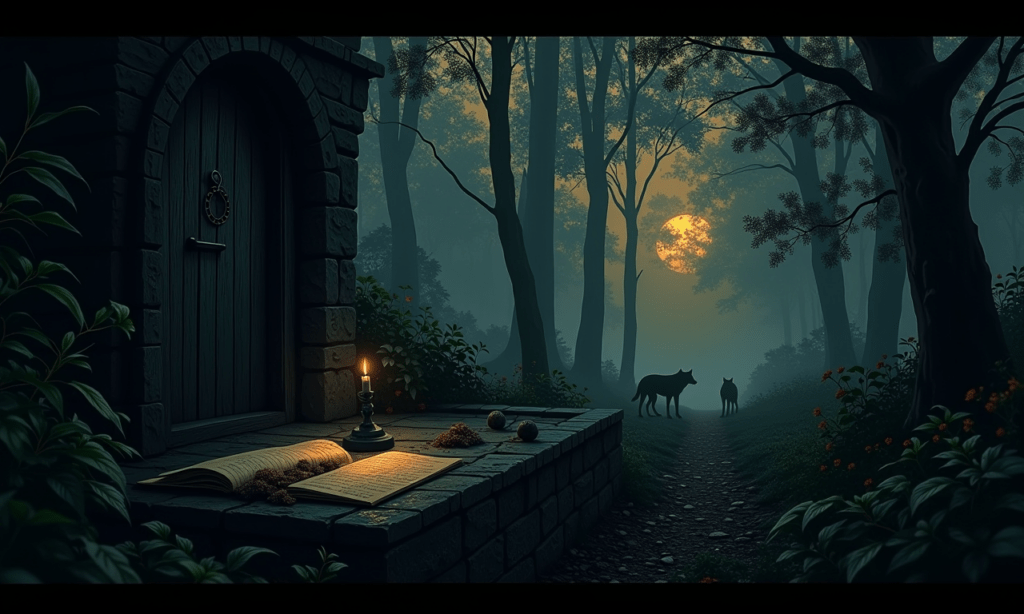
But there was one final horror yet to discover. As I turned the last page of Thomas’s journal, a pressed flower fell from between its leaves – wolfsbane, still fresh despite the months that had passed. And beneath it, in Eleanor’s hand, one last entry:
“My dearest love, by the time you read this, the transformation will be complete – not yours, but mine. What you saw die was merely a shell. On the night you thought you lost me, I finally understood the true nature of lykanthropy. It cannot be given; it must be chosen. And I chose to let that part of me die so that something else could live. Look for me in the woods beyond the cemetery on the full moon. I will wait for you there, my love, until you understand what I tried so desperately to tell you: sometimes the only way to keep our humanity is to embrace what lies beyond it.”
I closed the journal and looked toward the woods that bordered Ravensmoor Cemetery. In the distance, a wolf’s howl echoed through the trees – answered, after a moment, by another. And for the first time, I understood why Thomas Blackwood had smiled, even as the iron cross pierced his heart.
He had finally learned to recognize his wife’s voice.



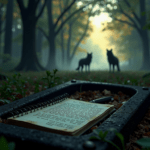



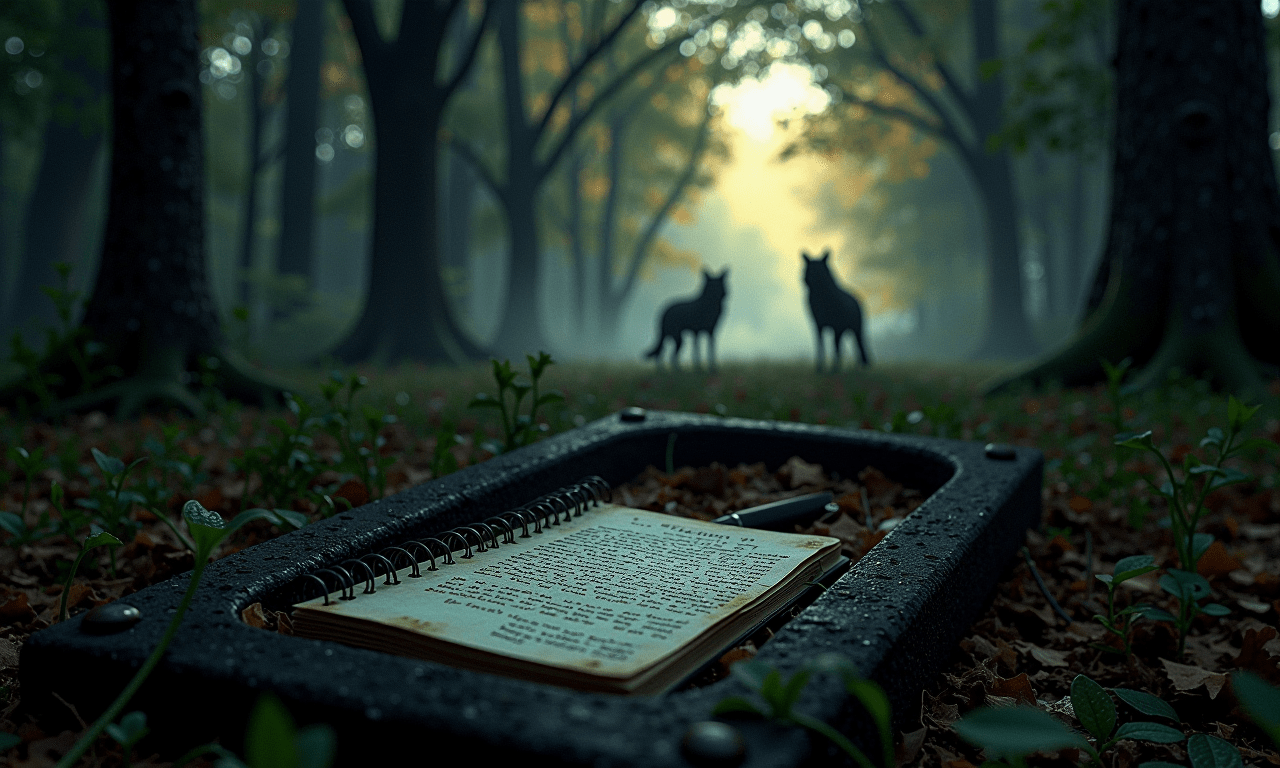



oh, wow – this should be a movie!